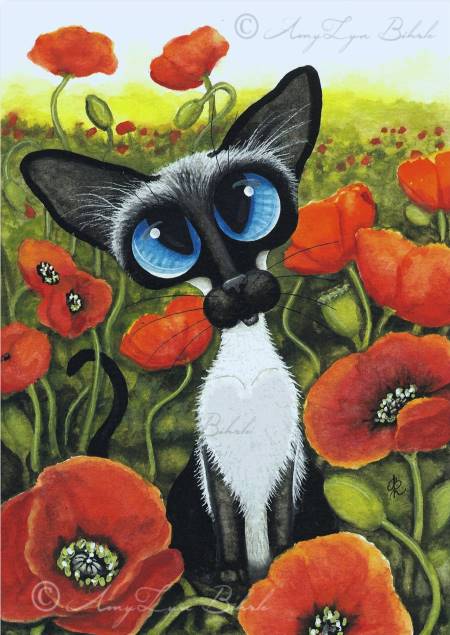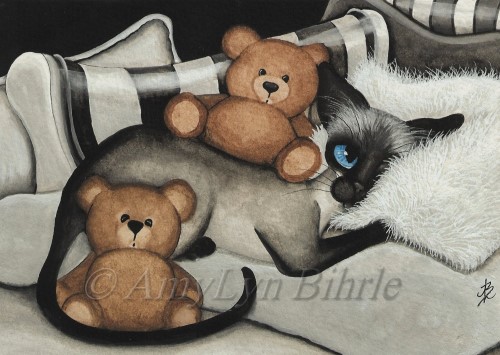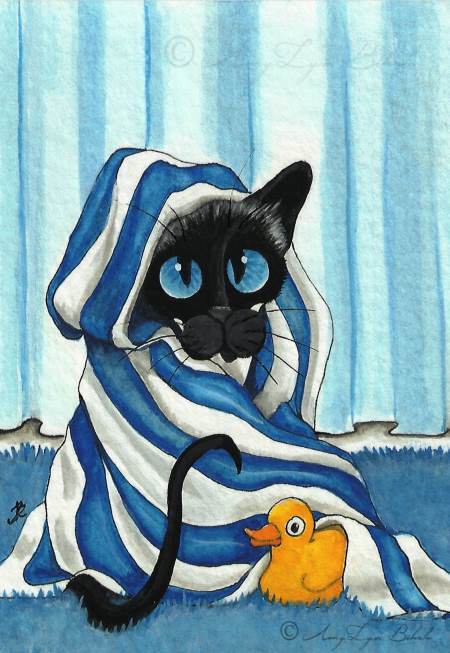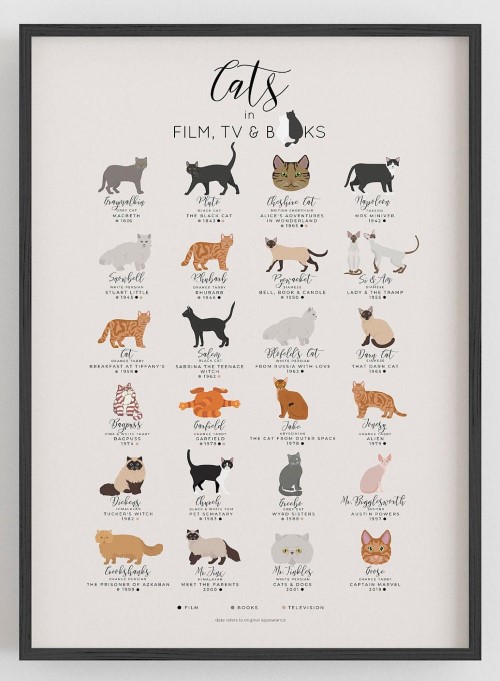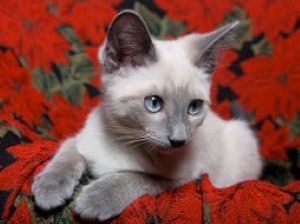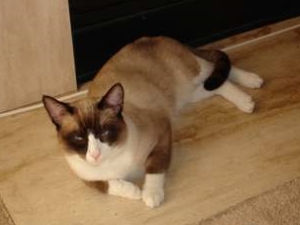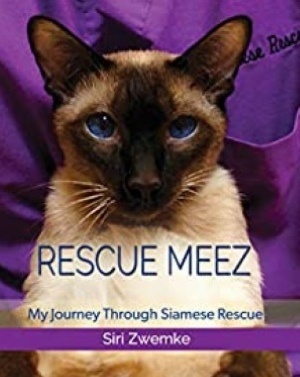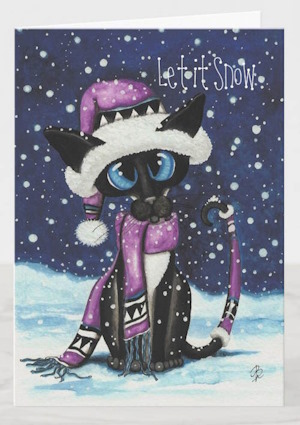- Home
- Meezer Musings
- July 2021
Meezer Musings: July 2021
Health Matters
Welcome to July's Meezer Musings!
This month we're talking about health, and in particular about keeping your cats safe and well in three very different areas - Covid-19, cat food safety, and staying cool in the heat.
As topics go, these aren't, perhaps, as bright and breezy as you'll find in some of our newsletters but they're important, so to lighten things along the way I've included some of artist AmyLyn Bihrle's beautiful art prints. (Copies of all of AmyLyn's artwork can be found and purchased from Etsy, either by clicking the images themselves, or the links underneath them.)
It's high summer for most of us (apologies to those of you in the southern hemisphere!) so let's begin with this wonderfully summery poppy field.
In April last year, as Covid-19 was spreading around the world, I wrote about what was known at the time about how the virus might affect our pets. For many of us the virus hasn't gone away and the global pandemic is far from over, so there's more information below about what's been discovered since then.
Our second item concerns an outbreak in the UK of feline pancytopenia, a rare condition that causes serious illness and death. The outbreak is believed to be linked to a number of cat foods, so we're taking a look at this and cat food safety generally.
And then, as the summer months have seen well above average temperatures for some of us, our final section looks at ways to keep cats cool and happy in the heat.
Cats and Covid-19
We now know all too clearly that Covid-19 spreads from human to human. But does it spread to animals? Could they pass it on to you, or to someone else?
According to the USA's Centers for Disease Control and Prevention (CDC) there's no current evidence that animals play a major role in spreading the disease, so the risk of contracting Covid-19 from your cats is probably low.
However, we do know that the virus can be transmitted from humans to animals, especially during close contact, such as an animal sleeping on your bed while you're infected.
One scientific study in the Netherlands discovered that the SARS-CoV-2 virus (it's the disease that's called Covid-19) can be found in pet cats and dogs whose owners have the disease. The scientists analyzed over 300 PCR tests from cats and dogs and found that over 17% of the animals had antibodies to the virus.
Although it's rare that animals catch the disease itself from their owners, the scientists who carried out the study say that there is a risk that pets could act as a reservoir for the underlying virus, and could potentially then reintroduce the virus to other humans.
That said, however, the good news is that there's no clear evidence at this time of pet-to-human transmission or even of pet-to-pet transmission.
What can you do?
It's always better to be safe than sorry, so if you suspect you have, or are confirmed to have, Covid-19 the current advice is that you should avoid close contact or cuddling with your cats (or other animals) or let them sleep on your bed while you're infected with the virus.
You should also practice basic hygiene measures like thorough hand-washing, avoid sharing food with your pet, and prevent cats and dogs coming in contact with people outside your own household.
More information can be found through the links above and also from:
Feline Pancytopenia Cat Food Recall
Our second item this month concerns news of an outbreak of feline pancytopenia that had a devastating outcome for those affected, and the recall of a number of cat foods thought to be connected with the outbreak.
In May, the UK's Royal Veterinary College (RVC) became aware of reports from vets of an increasing number of cases of feline pancytopenia, a rare bone marrow condition in which blood cells of all types (red cells, white cells, and platelets) are rapidly lowered, leading to anemia and increased susceptibility to serious infections and in the worst cases, death.
Cats initially affected by the condition may go off their food or seem more tired than usual, with the main sign of pancytopenia being bleeding from the mouth, nose or bowel.
The RVC launched a survey and an investigation into the outbreak, which led to a possible link with a number of cat foods manufactured by Fold Hill Foods, including Applaws Dry Cat food, the Pets at Home AVA range, and Sainsbury's Hypoallergenic Recipe range.
This in turn led to a recall of these foods by the UK's Food Standards Agency. A full list of the affected foods can be found here.
Over 500 cats are now known to have been affected and very sadly, 63% of the affected cats died.
I first heard of the situation as, tragically, these included cats belonging to members of some of the Siamese cat groups I follow on social media and my thoughts go out to everyone affected.
What can you do?
This outbreak specifically affected cats in the UK. While cat foods worldwide are generally very safe it's always worth checking, from time to time, on cat food recalls in your area. The easiest way to do this is by Googling "cat food recalls 2021" plus the country you live in, which should supply you with a list of links to follow.
And while, at the moment, veterinary access may be difficult, any change in the condition of your cat should be followed up with a vet check especially if there is any sign of bleeding from mouth, nose, ears or bowel (these signs are always a red flag, in any situation).
You can find out more about the UK outbreak here:
Cool for Cats
Many of us in the northern hemisphere have been experiencing some unusually high temperatures this summer, making it difficult for cats to stay cool in homes without air-conditioning.
So our final section provides some Topical Tips and ideas for keeping your cats cool in a heatwave.
Topical Tips for Summer Heat
Cats usually enjoy warm weather and are fairly heat tolerant, but can suffer from dehydration and heatstroke when temperatures soar.
With that in mind, here are ten tips for keeping your cat cool, healthy and happy in the summer months.
- Supply plenty of fresh cold water. This is always important, but in hot weather water evaporates very quickly. Check bowls regularly; clean them out and fill them up. Some cats like ice cubes
added to their water, some don't, so to experiment, provide a choice of iced and non-iced water. Don't use too
much ice though - one or two cubes is plenty to keep the water fresh without
over-chilling it.
- Feed wet food. Some cats don't drink enough, which can be a problem in hot weather. If you usually feed dry foods, consider switching to wet meals and adding water to them. Many cats love licking gravy, and adding water is a sneaky way of getting more fluid in.
- Provide shade and airflow. Indoors (and outdoors, if your cat's allowed out) make sure there's a cool, quiet, shady area they can retreat to. Keep curtains closed or shades drawn when the sun's on the windows. Rooms with ceiling fans for airflow are helpful too.
- Make cool spots. Many cats love lying on cool, tiled kitchen floors when it's hot, others choose to curl up in sinks, showers or baths. Laying wet towels down in these areas can help. It's possible to buy self-cooling mats for pets, but you can create cool spaces yourself by placing ice packs in cotton pillowcases in places where you cat likes to lie, or filling water bottles with ice cold water and placing them in cardboard boxes for your cat to find and use if they need to.
- Avoid too much play. Exercise generates heat, so keep play to a minimum in hot weather.
- Groom cats daily. In long-haired cats especially, matted fur can trap heat. Fur with no tangles allows air to flow freely through the coat. Daily brushing (for all cats) removes excess fur and helps to keep them cool.
- Check your outside buildings.
Inspect sheds, greenhouses, and summerhouses before closing them up.
Cats often creep inside for shade, but will dehydrate and die very
quickly in hot enclosed spaces without water.
- Avoid parked cars. Never leave cats alone in parked cars. On trips to the vet or on vacation, make sure the cat's in a secure cat carrier, use air-conditioning if you have it, open the windows if you have to park, and stay with the cat to keep an eye on it.
- Check for dehydration. Pinch the skin at the back of your cat's neck - it should spring back immediately. If it doesn't, chances are they're dehydrated. Dehydration can be serious so always seek veterinary advice.
- Watch for signs of heatstroke.
Panting, drooling, vomiting, listlessness or lethargy, dilated pupils
and a rapid heartbeat are all signs of heatstroke. If you notice any of
these things take your cat to the vet immediately. You can help to cool your
cat down on the way by sponging their heads and coats with cold, damp,
towels.
Tail End ...
To end with something completely different, a couple of months back our Meezer Musings topic was Siamese cats in books, and I've written in other places about Siamese cats in movies and other art forms, so I was amused to stumble across the poster below on Etsy recently.
Siamese cats are well-represented by DC (That Darn Cat), Pyewacket (Bell, Book and Candle), and Si and Am (Lady and the Tramp).
There are also honorable mentions for two Himalayans - Dickens, from the TV series Tucker's Witch, and Mr Jinx, who starred alongside Robert de Niro in the movie Meet The Parents. See if you can spot them all!
That's all for this month but I'll be back at the end of August. Meanwhile, wherever you are, stay safe, stay healthy and stay happy.
Caroline
Missed a Meezer Musings? A list of previous newsletters can be found here.
Some of the articles and newsletters on this site may contain links to products I think you may enjoy. If
you purchase through these links I receive a small commission, but there's
no extra cost to you. Find out more on the Affiliates Disclosure page.
Have You Discovered Our Newsletter?
If not, why not? Subscribe to our email newsletter, Meezer Musings, to stay in touch, be the first to see new information and pages as they come out, and read the things we only talk about in the newsletter.
Learn more about it on our Newsletter Sign-Up page.
